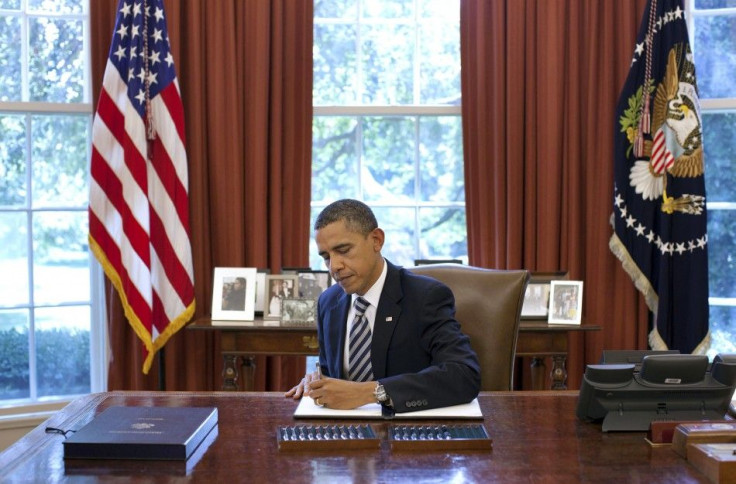Analysis: Confidence in Obama's leadership shaken

A spree of bad news -- market gyrations, fears of a double-dip recession, stubborn unemployment and fallout from a debt deal -- has shaken confidence in President Barack Obama's leadership and could cloud his chances for winning re-election.
Obama is seeking a second term in office in an election that is still far off -- November 2012. But a persistently weak economy coupled with rising perception of political dysfunction in Washington could complicate his political fortunes.
The political spectacle that preceded a bipartisan deal this month to raise the debt ceiling and the subsequent downgrading of America's credit rating by a leading rating agency have spawned stories in the media about America's decline as a world power on Obama's watch.
And opinion polls show that Obama's job approval ratings are edging downward even as members of his own Democratic Party grumble about his leadership and fault his willingness to make concessions to opposition Republicans in Congress.
A Reuters/Ipsos poll Wednesday found that 73 percent of Americans believe the country is off on the wrong track.
This was the highest reading since October 2008 when the financial crisis was raging and just weeks before voters turned away from the Republican Party of then-President George W. Bush to put Obama into the White House.
"It is hard to imagine public optimism being more negative about the economy than it is right now. ... In terms of pubic opinion he has got a huge hill to climb," said Karlyn Bowman, a senior fellow at the American Enterprise Institute think tank.
"I think Americans would like to re-elect the first African American president, but ultimately the presidential election is a referendum on performance," she said.
Obama also faces a daily drumbeat of criticism from the field of Republicans seeking their party's presidential nomination to face him in the 2012 general election. The field grows this week with Texas Governor Rick Perry, seen as a potential tough challenger, set to join the race Saturday.
MARKET TURMOIL
There have been huge swings in the markets this week. The Dow Jones industrial average has swung hundreds of points in either direction amid concern over the economy, the debt crisis in Europe and the U.S. credit downgrade.
"The debt ceiling fiasco and the downgrade, punctuated by ... stock market gyrations, has made something in me snap," said Matt Miller, a senior fellow at the left-leaning Center for American Progress. "It's the sound of confidence in Obama's leadership breaking," he wrote in Friday's Washington Post."
"The president has failed up until now to produce a coherent explanation about where we are and what we need to do that Americans can understand," said William Galston, a senior fellow at the Brookings Institution think tank.
Obama has promised to deliver a steady stream of good ideas to lift hiring, and will head out on a three-day bus tour of the Midwest Monday to talk about his vision.
But so far he has only renewed calls for action on a batch of measures that he has talked about for months, including the extension of a payroll tax cut and unemployment aid.
In the meantime, Americans have been worried by the recent turmoil that has been reminiscent of the 2008 financial crisis, with stock prices down by 10 percent from last month amid concern over another recession.
Christina Romer, a former top Obama economic advisor, said the risk of a recession has increased and urged the president to think big about a program that could create the hundreds of thousands of jobs that she says the economy needs.
"He has a unique opportunity now to really make the case to the American people. Congress is home and it is a chance for him to try to build consensus around a bold alternative," said Romer, a professor of economics at the University of California, Berkeley. The Congress is on summer recess.
Lawmakers agreed to raise the debt ceiling in return for measures to lower the deficit.
They will convene a special committee to examine reforms of the tax code and government programs like the Medicare health insurance program for the elderly. But Republicans say that big government spending, which is what unnerved markets in Europe, is not the solution.
"The need we face is for structural reform, not stimulus," said Glenn Hubbard, a former top economic adviser to Bush. "Making credible long-term improvements in the nation's fiscal position can have powerful short-term effects by lessening uncertainty about future tax burdens."
© Copyright Thomson Reuters 2024. All rights reserved.





















